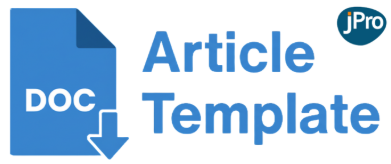THE ROLE OF COMMUNITY-BASED RESOURCES IN FORMING A NEW MICROBUSINESS
DOI:
https://doi.org/10.32815/jpro.v5i3.2431Keywords:
Structuration, Rules and Community-based Resources, MicrobusinessAbstract
This study aims to analyze the role of community-based resources in the formation of a new organization. This is conceptualized as resources that are socially and culturally constructed within a community, can be mobilized easily and interpreted independently depending on the purpose of business owners. It is argued that community-based resources play a critical role in forming a new organization. We employ a qualitative approach to explain its role in establishing a new microbusiness in Indonesia. Based on the interview, we found that community-based resources that are represented by new ingredients and cooking methods (i.e., a new way of producing food) played significant roles in new micro-businesses’ emergence in terms of expanding customers’ demand, providing a clear timing for new organizational emergence, and allowing the condition of resource-driven structuration.
References
Astley, W. G. (1985). The Two Ecologies: Population and Community Perspectives on Organizational Evolution. Administrative Science Quarterly, 30(2), 224–241. https://doi.org/10.2307/2393106
Bourdieu, P. (1977). Outline of A Theory of Practice. Cambridge University Press.
Caroll, G. R., & Swaminathan, A. (2000). Why The Microbrewery Movement? Organizational Dynamics of Resource Partitioning in The US Brewing Industry. American Journal of Sociology, 106(3), 127–175.
Carroll, G. R., & Hannan, M. T. (2000). The Demography of Corporations and Industries. Princeton University Press. https://doi.org/doi:10.1515/9780691186795
Deephouse, D. L. (2000). Media Reputation As A Strategic Resource: An Integration of Mass Communication and Resource-Based Theories. Journal of Management, 26(6), 1091–1112. https://doi.org/10.1177/014920630002600602
Feldman, M. S. (2004). Resources in Emerging Structures and Processes of Change. Organization Science, 15(3), 295–309. https://doi.org/10.1287/orsc.1040.0073
Giddens, A. (1979). Central Problems in Social Theory (1st ed.). Red Globe Press.
Giddens, A. (1984). The Constitution of Society. University of California Press.
Gioia, D. A., & Thomas, J. B. (1996). Identity, Image, and Issue Interpretation: Sensemaking During Strategic Change in Academia. Administrative Science Quarterly, 41(3), 370–403. https://doi.org/10.2307/2393936
Hannan, M. T., & Freeman, J. (1989). Organizational Ecology. Harvard Univeristy Press.
Hicks, M. S. (2021). The COVID-19 Small Business Boom: Startups Surge During Pandemic. US Bureau of Labour Statistics. https://www.bls.gov/opub/mlr/2021/beyond-bls/the-covid-19-small-business-boom-startups-surge-during-pandemic.htm
Hitt, M. A., Bierman, L., Shimizu, K., & Kochhar, R. (2001). Direct and Moderating Effects of Human Capital on Strategy and Performance in Professional Service Firms: A Resource-Based Perspective. Academy of Management Journal, 44(1), 13–28. https://doi.org/10.5465/3069334
Hutahayan, B. (2019). Factors affecting the performance of Indonesian special food SMEs in entrepreneurial orientation in East Java. Asia Pacific Journal of Innovation and Entrepreneurship, 13(2), 231–246. https://doi.org/10.1108/apjie-09-2018-0053
International Labor Organization. (2020). COVID-19 Enterprises Resources (ENTERPRISES). https://www.ilo.org/empent/areas/covid-19/lang--en/index.htm
International Trade Centre. (2020). Supporting small businesses through the COVID-19 crisis. http://www.intracen.org/covid19/
Kamien, M. I., & Schwartz, N. L. (1982). Market Structure and Innovation. Cambridge University Press.
King, A. W., & Zeithaml, C. P. (2001). Competencies and Firm Performance: Examining The Causal Ambiguity Paradox. Strategic Management Journal, 22(1), 75–99. https://www.jstor.org/stable/3094255
Kurniawati, E., & Setiawan, A. (2019). The Role of Indonesian Micro, Small, and Medium Enterprises Owners in Choosing e-Commerce Strategy in the Global Market. 1st International Conference on Social Knowledge Sciences and Education, 320, 191–194. https://doi.org/10.2991/icskse-18.2019.37
Langley, A., & Abdallah, C. (2011). Templates and Turns in Qualitative Studies of Strategy and Management. Research Methodology in Strategy and Management, 6(June 2011), 201–235. https://doi.org/10.1108/S1479-8387(2011)0000006007
LPPI and Bank Indonesia. (2015). Profil Bisnis Usaha Mikro, Kecil Dan Menengah (UMKM). In Bank Indonesia and LPPI. https://www.bi.go.id/id/umkm/penelitian/nasional/kajian/Documents/Profil Bisnis UMKM.pdf
Mazzarol, T., Clark, D., Reboud, S., Gough, N., & Olson, P. (2014). Perceptions of innovation climate and the influence of others: A multi-country study of SMEs. International Journal of Innovation Management, 18(1). https://doi.org/10.1142/S1363919614500091
Okundaye, K., Fan, S. K., & Dwyer, R. J. (2019). Impact of information and communication technology in Nigerian small-to medium-sized enterprises. Journal of Economics, Finance and Administrative Science, 24(47), 29–46. https://doi.org/10.1108/JEFAS-08-2018-0086
Penrose, E. (1995). The Theory of the Growth of the Firm (3rd edn) (3rd ed.). Oxford University Press. https://doi.org/https://doi.org/10.1093/0198289774.001.0001
Rafei, Y. D., Safrida, I. N., Ningrum, J., Adam, S. Y., Sukamto, A., & Fadillah, I. J. (2020). Industri Mikro dan Kecil di Masa Pandemi Covid-19 2020.
Rubin, P. H. (1973). The Expansion of Firms. Journal of Political Economyu, 81(4), 936–949.
Ruef, M. (2000). The Emergence of Organizational Forms: A community Ecology Approach. American Journal of Sociology, 10(3), 658–714. https://doi.org/10.1086/318963
Sewell, W. H. J. (1992). A Theory of Structure: Duality, Agency, and Transformation. The American Journal of Sociology, 98(1), 1–29.
Stanley, S. M. (1981). The New Evolutionary Tmetable. Basic Books.
The World Bank Group. (2020). Global Economic Prospects (Issue June). https://doi.org/10.2307/j.ctt183pb3w.5
Tirta, A., & Sarli, P. W. (2021). Indonesia’s SME Hold Economy to Growth. How Can They Scale Up? https://www.weforum.org/agenda/2021/09/how-can-indonesian-smes-scale-up/
Undang-Undang Republik Indonesia Nomor 20 Tahun 2008, Pub. L. No. Nomor 93 (2008).
Wiklund, J., & Shepherd, D. (2003). Knowledge-Based Resources, Entrepreneurial Orientation, and The Performance of Small and Medium-Sized Businesses. Strategic Management Journal, 24(13), 1307–1314. https://doi.org/10.1002/smj.360
Xu, Y. (2018). The Ecological Dynamics of Organizational Change: Density Dependence in the Rate of Weibo Adoption by Populations of News Organizations. International Journal of Communication, 12, 1612–1637.
Zhu, K., & Kraemer, K. L. (2002). E-Commerce Metrics for Net-Enhanced Organizations: Assessing The Value of E-Commerce to Firm Performance in The Manufacturing Sector. Information Systems Research, 13(3), 275–295. https://doi.org/10.1287/isre.13.3.275.82
Downloads
Published
How to Cite
Issue
Section
License
Copyright (c) 2024 Lussia Mariesti Andriany

This work is licensed under a Creative Commons Attribution 4.0 International License.
The copyright of the article belongs to the author without any restrictions.






